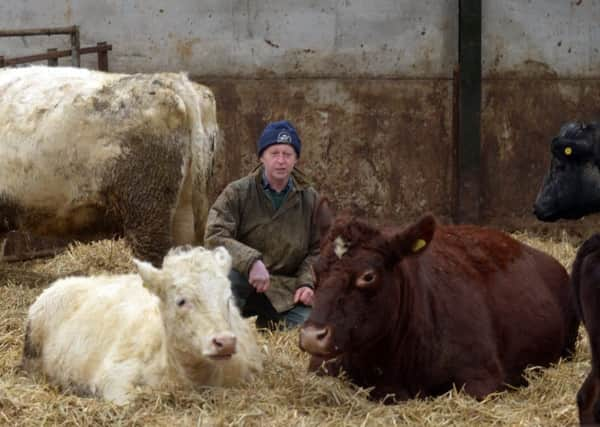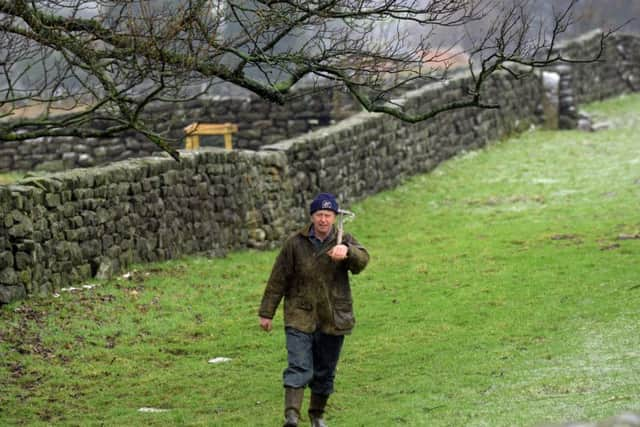Farm of the Week: Reliance on the land in the lesser visited North Yorkshire dale


Its farmers still largely rely on making a living from the land, running hill sheep and suckler cattle.
But life is being made more difficult for Jonathan Murray on his 80-acre Brown Hill Farm and for many of his farming colleagues in the hills as the new European farm payment, the Basic Payment Scheme (BPS), has not yet arrived. Add to that the end of his countryside stewardship scheme payment last year, along with depressed sheep prices and you might be forgiven for thinking that he’s about to dig his own grave in the green burial site he runs as his one alternative enterprise, but he’s matter-of-fact about it all.
Advertisement
Hide AdAdvertisement
Hide Ad“My target has always been for the farm itself to break even and that any support payments provide me with a living and the ability to invest, but recently we’ve lost what was the Hill Farming Allowance, the new countryside stewardship schemes are proving both inaccessible and prohibitive; and there is talk of the BPS perhaps not getting to farms like mine for months yet. This is the first time since I came here in 1995 that we haven’t had some form of environmental payment and with the BPS payment being delayed there is pressure on many.


“The problem is that farm finances have been tailored to these payments coming in and in the last seven or eight years the SFP (Single Farm Payment) has always come in the December/January window and for anyone who has not received theirs it is causing problems.”
To make up for the delayed payment there’s a risk farmers could end up flooding the market with sheep and cattle in order to maintain their own cash flow.
“If we have to go out and sell stock to make up for any current shortfall it could lead to further depressed prices when things are already not so great anyhow. The store lamb price in autumn was around £10 a head down on the previous year and although cattle prices were slightly back they were still acceptable as we’d had a good price the year previously.”
Advertisement
Hide AdAdvertisement
Hide AdJonathan hails from Corbridge in Northumberland and settled in North Yorkshire having studied for his HND in agriculture at Myerscough College in Lancashire. He spent a year self-employed odd-jobbing on farms before taking up what was to be a 30-year career teaching agriculture to day release students at Askham Bryan College.


“As I was only a little older than the students when I started I looked pretty much like one of them. I remember arranging a visit to a farm and when we got there the farmer asking ‘where’s the boss?”
Having spent weekends helping students and young farmers on their farms Jonathan was beginning to think that he could farm in his own right when he was offered the opportunity to do just that.
“My grandmother had farmed, but my father hadn’t. He was a doctor. I’d worked on farms in Northumberland from being about 10-years-old so it was in my blood even though I didn’t have the money to be able to farm, but then I was given the chance to rent 10 acres near Guisborough and I started off with 30 Mule ewes. I added pedigree Texels in 1990 to try and make my sheep operation a little more lucrative and it was working fairly well. I had the use of a building for lambing and rented a couple of horse paddocks.”
Advertisement
Hide AdAdvertisement
Hide AdAs well as his lecturing and small-scale farming operation Jonathan was also contract shearing during weekends and the summer. It was in the course of one of his jobs that his move to Westerdale came about in 1995.
“I was shearing for a neighbouring farm and was told that this place was coming on to the market. I have 80 owned acres and rent a further 10, plus I have moors rights for around 250 acres. On the moors I have 160 Swaledale and Cheviot X ewes and on the farm itself I have 20 pure Texel ewes. The Texels lamb in mid-March while the hill sheep lamb a month later.”
One of Jonathan’s other concerns is drivers. The moors road that links Hutton-le-Hole to Castleton is a renowned sheep killer.
“I lost another on Friday when one was hit. It’s a constant problem.”
Advertisement
Hide AdAdvertisement
Hide AdCattle are a passion for Jonathan, too. “I started off with two dozen Aberdeen Angus X suckler cows on autumn calving and primarily selling stock at 10-12 months, but five years ago I was looking for a quieter, easier to handle animal and went for the Beef Shorthorn. I’ve been gradually building up on those and using a Shorthorn bull on to the Angus X that has potentially brought about a Murray Grey, which I might then finish off with a Limousin in years to come. I currently have 25 breeding cows and 46 head of cattle overall. Most of my stock whether sheep or cattle goes through Ruswarp livestock market.”
Jonathan’s green burial site came about just after foot and mouth disease year in 2001.
“I saw that this was developing around the UK and since it was something I could do with limited resources and minimal maintenance I went ahead. I was fortunate to also receive a small grant from Growing Routes run by the Yorkshire Agricultural Society. I don’t advertise and I undertake about six burials a year.
Jonathan is treasurer of the Yorkshire Federation of Commoners and Moorland Graziers that has more than 100 members nationally. His latest literature from the National Common Land Stakeholders Group did not make pretty reading.
Advertisement
Hide AdAdvertisement
Hide Ad“I had an email from them last week that said people with common land should not be expecting their BPS payment until April or May and in some cases that are more complex not until after 30 June. That’s not good.”